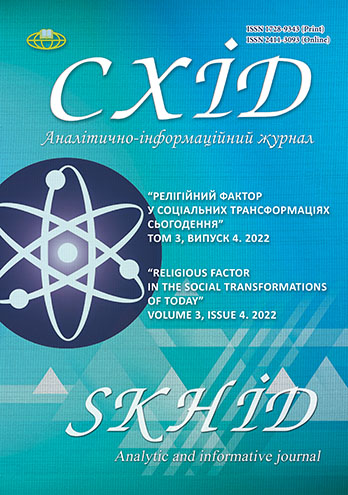The dynamics of intra-Orthodox relations in Ukraine in the situation of the russian-Ukrainian war
DOI:
https://doi.org/10.21847/1728-9343.2022.3(4).270054Keywords:
Ukrainian Orthodoxy, national mentality, spiritual space, imperial policy, Moscow Orthodoxy, annexation of dioceses, church dialogueAbstract
The article examines the changes in the Orthodox world caused by Russia’s full-scale military invasion of Ukraine. Considerable attention is paid to the geographical location of the Ukrainian state at the crossroads of East and West, which determines the specificity of geopolitical and religious processes in the region. Attention is focused on the historical context of the development of Ukrainian Orthodoxy, the meaning of the concept of “canonical territory”, the attitude of former empires to lost territories is considered; prospects for further dialogue between Ukrainian Orthodox churches are outlined. The process of formation of the national mentality of Ukrainians and thus the formation of a single political and spiritual space, the features of which are a reflection of the dominant national type, is considered. The geopolitical confrontation between Russia and the Western world, whose technological parity stimulates ideological confrontation, and which is often broadcast by Russia through religious narratives, is highlighted. The study compares the position and perception of the russian federation regarding the spiritual environment of Ukraine with the real self-perception of the Ukrainian clergy and believers. The rhetoric of the highest church leadership of Russia at the beginning of the military intervention, as well as the reaction of representatives of the local church and flock to it, is critically evaluated. Attention is paid to the reaction of foreign churches to the events in Ukraine. The problem of the transition of Ukrainian dioceses under the jurisdiction of the Russian Orthodox Church in the occupied territories is highlighted. The materials of the article are aimed at forming a comprehensive idea of the recent history of Ukraine and its Church.
Downloads
References
BBC News Ukraine. (2022, February, 12). Zelenskyi: u NATO kazhut - dveri vidkryti, ale poky shcho storonnim vkhid zaboroneno. https://www.bbc.com/ukrainian/60446478 (In Ukrainian).
Bovua, D. (2011). Gordiev uzel Rossijskoj imperii: Vlast, shlyahta i narod na Pravoberezhnoj Ukraine (1793-1914). Moscow, Novoe literaturnoe obozrenie (In Russian).
Chornomorets, Yu. (2022, May, 31). Obiednannia UPTs MP ta PtsU – lyshe pytannia chasu. Ukrainske Radio. http://www.nrcu.gov.ua/news.html?newsID=98839 (In Ukrainian).
Dodonov, R.A. (1998). Etnicheskaya mentalnost: opyt socialno-filosofskogo issledovaniya. Zaporizzia, r/e «Tandem-U» (In Russian).
Evans, Jonathan and Baronavski, Chris (2018, December, 5). How do European countries differ in religious commitment? Use our interactive map to find out. Pew Research Center. https://www.pewresearch.org/fact-tank/2018/12/05/how-do-european-countries-differ-in-religious-commitment/
Gudzyk, Klara (2005, September, 9). «Kanonichna terytoriia». Koly, chomu y navishcho zapushcheno v shyroke vykorystannia tse slovospoluchennia. Den, 163. https://day.kyiv.ua/uk/article/cuspilstvo/kanonichna-teritoriya (In Ukrainian).
Honcharenko, R. (2022, February, 20). Zelenskyi v Miunkheni: prokhannia pro dopomohu ta liapasy Zakhodu. DW. https://www.dw.com/uk/miunkhenska-promova-zelenskoho-prokhannia-pro-dopomohu-ta-liapasy-zakhodu/a-60845127 (In Ukrainian)
Houston, Aidan & Mandaville, Peter (2022). The Role of Religion in Russia’s War on Ukraine (The battle for Ukraine’s spiritual independence has deep roots in the region’s religious history). United States Institute of Peace. https://www.usip.org/publications/2022/03/role-religion-russias-war-ukraine
Huntington, S.P. (2021). The Clash of Civilizations. Moscow, AST (In Russian).
Krym.Realii. (2022). Ukrainskaya pravoslavnaya cerkov obyavila o nezavisimosti ot RPC. https://ru.krymr.com/a/news-ukrainskaya-pravoslavnaya-tserkovj-obyavila-nezavisimost-rpts/31872040.html (In Russian).
Lomachinska, I., Deinega, E.., & Donets, O. (2021). The religious factors of the ukrainian mentality formation. Skhid, 1(3), 34–39. https://doi.org/10.21847/1728-9343.2021.1(3).242755
Mearsheimer, J.J. (1993). The case for a Nuclear Determent. Foreign Affairs, 72(3) (Summer), 50–66.
Miller, А. (2013). Ukrainskij vopros v Rossijskoj Imperii. Kyiv, Laurus (In Russian).
Pertzev, A. (2022, March, 23). V mirovom pravoslavii gryadut tektonicheskie sdvigi. «Imperskij povorot» patriarha Kirilla i ego propovedi ob Ukraine raskalyvayut RPC. A dalshe budet tolko huzhe. Meduza. https://meduza.io/feature/2022/03/23/v-mirovom-pravoslavii-gryadut-tektonicheskie-sdvigi
Plokhy, S. (2006). The Origins of the Slavic Nations. Premodern Identities in Russia, Ukraine, and Belarus. New York, Cambridge University Press.
Pravoslavna Sumshchyna. (2022). My prodolzhaem pominat na bogosluzheniyah Blazhennejshego Onufriya, Mitropolita Kievskogo i vseya Ukrainy, i Vysokopreosvyashchennejshego Evlogiya, mitropolita Sumskogo i Ahtyrskogo. My ostaemsya v sostave Ukrainskoj Pravoslavnoj Cerkvi. https://portal-pravoslavie.sumy.ua/novini-eparhii/sumska-eparhiya-upc-pripinyae-molitovne-pominannya-moskovskogo-patriarha.html (In Russian).
Slovo I Dilo. (2022, September, 26). «Yadernyj klub»: skilky boiegolovok ye v nayavnosti u kraiin svitu ta skilky z nych rozhornuti. https://ru.slovoidilo.ua/2022/09/26/infografika/politika/yadernyj-klub-skolko-boegolovok-est-nalichii-stran-mira-i-skolko-nix-razvernuty
The Christian Science Monitor. (2022, October, 3). Russia’s religious war in Ukraine. https://www.csmonitor.com/Commentary/the-monitors-view/2022/1003/Russia-s-religious-war-in-Ukraine
Tolochko, A. (2021). Kievskaya Rus i Malorossiya v ХІХ veke. Kyiv, Laurus. (in Russian).
Toynbee, A.J. (2011). Civilization on trial. Moscow, AST (In Russian).
Downloads
Published
How to Cite
Issue
Section
License
Copyright (c) 2022 Євген Дейнега

This work is licensed under a Creative Commons Attribution-NonCommercial-NoDerivatives 4.0 International License.
1. Authors bear responsibility for the accuracy of facts, quotations, numbers and names used.
2. Manuscripts are not sent back.
3. The publisher does not always agree with the authors' opinion.
4. The authors reserve the right to authorship of the work and pass the first publication right of this work to the journal under the terms of a Creative Commons Attribution-NonCommercial-NoDerivatives 4.0 International License. This license allows others to distribute (copy) the published work for non-commercial purposes, provided there is mandatory attribution to its authors and a link to the first publication in our journal.
5. The authors have the right to conclude separate supplement agreements that relate to non-exclusive work distribution in the form in which it has been published by the journal (for example, to upload the work to the online storage of the journal or publish it as part of a monograph), provided that the reference to the first publication of the work in this journal is included.

